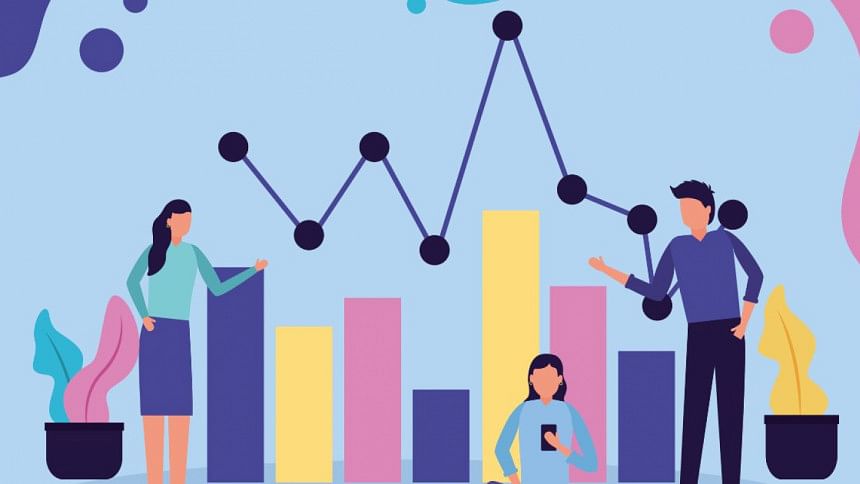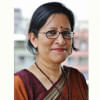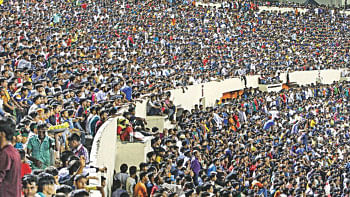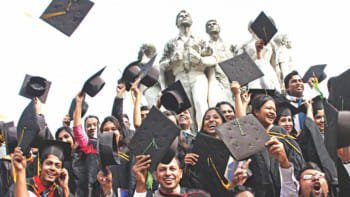Bangladesh must invest in youth development

Bangladesh celebrated 50 years of independence in 2021 – a young country with a young population, and aspirations. According to the recent census, the total population of Bangladesh stands at 169.8 million, and 27.96 percent of them are young people, aged between 15 and 29 years. Compared with the 2011 census, the percentage of young people increased from 26 percent to 27 percent. The latest Labour Force Survey (2022) indicates that the youth labour force, aged between 15 and 29 years, stands at 26.82 million, or 36.53 percent of the total labour force, which is 73.41 million.
This data indicates that Bangladesh has an unprecedented upsurge of young people in its demography. However, they have limited scope of participation and access to leadership structures to shape national development agenda. Traditions, hierarchical and patriarchal norms, and practices leave young people, particularly young women, and other marginalised groups aside, limiting their access and opportunities to engage in decision-making structures. Current representation trend in parliament reflects a similar trend where only 0.29 percent of its members are under 30 and 5.71 percent are under 40 years of age.
Employment also remains the biggest concern. Close to 2.2 million young people enter the job market every year. According to the LFS in 2016-17, youth unemployment rate was more than double and stood at 10.6 percent, compared to the national average rate of 4.2 percent. A closer review indicates that there is a correlation between the higher level of education and higher rate of unemployment in Bangladesh. About 29.8 percent youth with secondary education, 13.4 percent with tertiary education and only four percent with no education remain unemployed. In addition, the share of NEET youth (not in education, employment or training) within the total youth population is 29.8 percent.
This exhibits a huge mismatch between the education system and the job market. Moreover, the substandard vocational and technical training courses have negligible impact on employment generation and access to the job market, in the opinion of experts. The rising number of training spaces and courses over the last few years is not effective either.
When it comes to women's participation, a smaller number of women enrol in vocational and technical education. For example, data from the World Bank (2018) reveals that only 27 percent of secondary students join the vocational stream. Fourteen percent of polytechnic students were women in 2016. As a result, an excessive number of women, particularly young women (92 percent, according to a2i 2022), are opting or being forced to engage in the informal sector economy, which comes with low productivity and often an indecent work environment. About 89.2 percent of youth workers (91.6 percent of whom are young women) experienced lack of decent working conditions, particularly during the pandemic. Eighty percent of the young respondents reported that they had experienced an income reduction during the pandemic.
The pandemic negatively impacted young people's education, particularly those from marginalised communities. Although the education system was transformed into an online system, in a survey conducted by the Citizen Platform for SDGs Bangladesh, 64 percent of the respondents were not involved in any online education or training programmes. This can be attributed to poor connectivity, shortage of smart devices, excessive costs, and a lack of interactive content. Moreover, schoolteachers were not fully equipped and trained to conduct online classes.
More initiatives and substantial investment are critical to empower youth to be the real change agents for the country. All stakeholders need to come together to help them step up and lead to realise the SDGs by 2030, Paris Agreement, and the just transition particularly in the areas of social justice, gender justice, and climate justice.
The enormous digital divide that young people continue to experience due to societal gender roles and disparities between urban and rural areas remains a major concern. Thirty-five percent of rural residents have internet access, compared to around 55 percent of urban residents. Of those who use the internet, 81 percent are between the ages of 16 and 24.
Online safety is also increasingly becoming a concern. According to a survey by ActionAid Bangladesh, 63.51 percent of women, between the ages of 15 and 35, experienced various forms of online violence on different digital platforms, such as being sent hateful and insulting sexual remarks, sexually explicit images on social media inboxes, sharing of private photos on social media without permission, and threats of sexual assault.
There is underinvestment in young people as reflected in the national budget, posing a significant threat to youth development that would enable the country to make the transition to a "smart" nation. The investment for quality education, skills development, livelihood and employment, sexual and reproductive health and rights, social protection concerns, etc are the most pressing issues. For example, funding for the Ministry of Youth and Sports was significantly cut in the 2023-24 budget.
Young people in Bangladesh frequently express concern about not having adequate information and access to government institutions and service providers. The deprivation is more severe among the youth from different excluded and impacted groups, such as the Dalits, ethnic minorities, Indigenous communities, and young people with disabilities.
To address the challenges and harness the power of youth in Bangladesh, in addition to the government initiatives, various non-governmental organisations including ActionAid Bangladesh have been developing the leadership capacity of youth, particularly young women, from the grassroots to encourage them to take on leadership positions in various decision-making bodies. The participation of grassroots youth is facilitated through these interventions in various social development initiatives, campaigns for climate justice, and advocacy for innovative actions. Young people are provided support to practise agroecology and climate-resilient sustainable agriculture, along with the tools they need to speak up about the climate vulnerabilities of marginalised communities and to demand action from national and international decision-makers. To address the digital divide, marginalised youth are also equipped with digital literacy and skills, so that they can leverage online platforms for learning, networking, advocacy, and campaigning.
Climate change has emerged as one of the most pressing global challenges of our time, affecting ecosystems, economies, and human well-being. As greenhouse gas emissions continue to rise, the world is experiencing a range of adverse effects, including extreme weather events, sea-level rise, and the loss of biodiversity. These impacts often result in what is referred to as loss and damage. The youth in Bangladesh are the most vulnerable in this reality.
More initiatives and substantial investment are critical to empower youth to be the real change agents for the country. All stakeholders need to come together to help them step up and lead to realise the SDGs by 2030, Paris Agreement, and the just transition particularly in the areas of social justice, gender justice, and climate justice.
Farah Kabir is country director of ActionAid Bangladesh.
Nazmul Ahsan is manager, Young People at ActionAid Bangladesh.


 For all latest news, follow The Daily Star's Google News channel.
For all latest news, follow The Daily Star's Google News channel. 












Comments